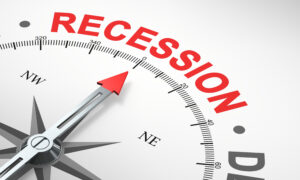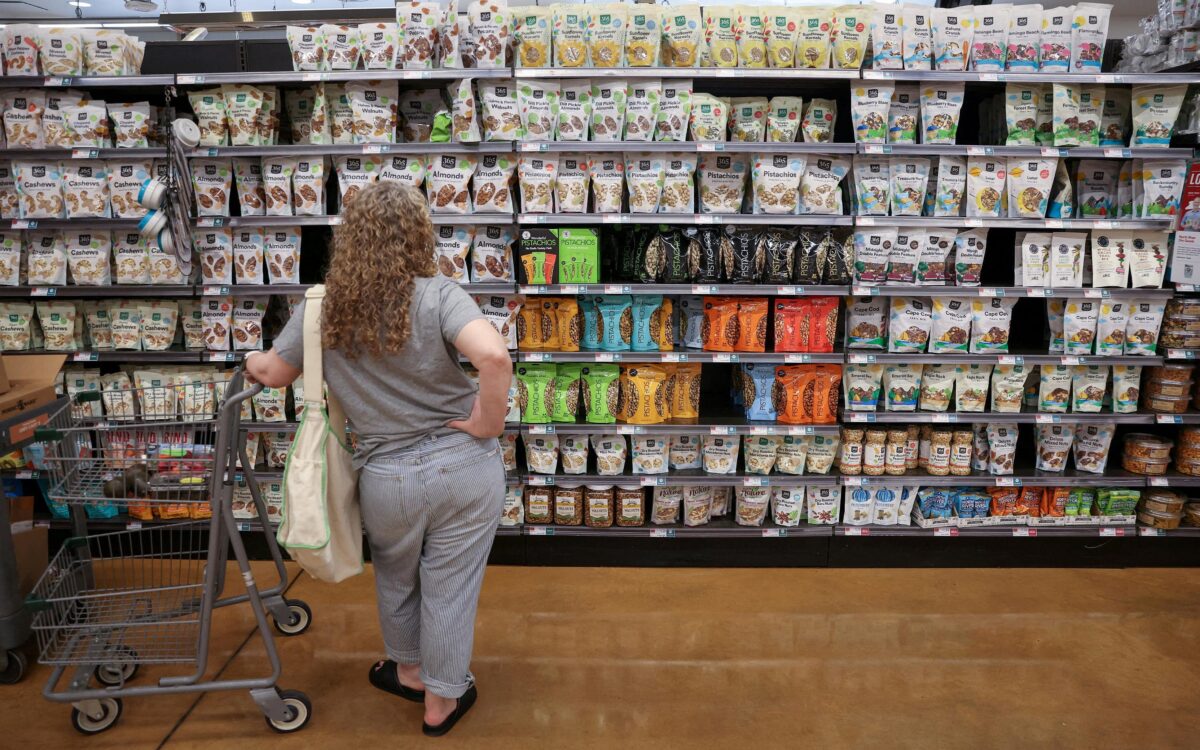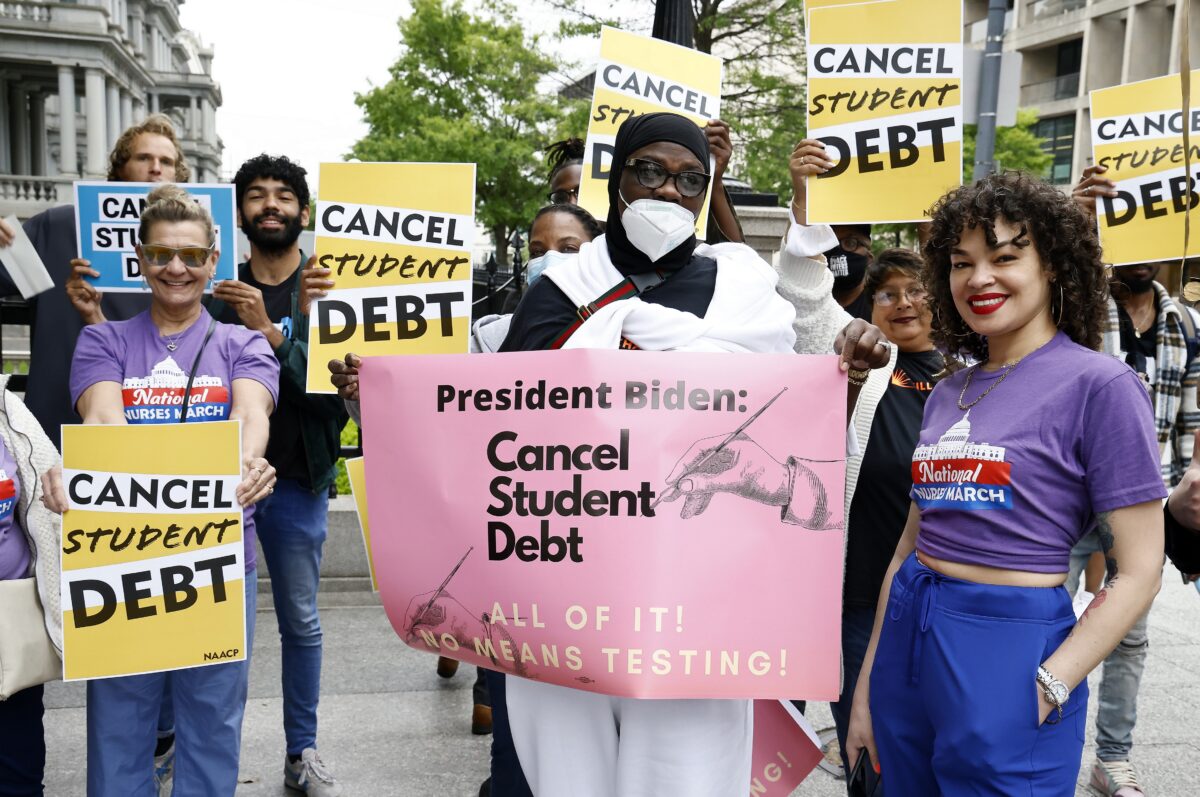Democrats Flee When Recession Is Mentioned
CommentaryThe top issue going into the midterm elections is the economy, with inflation and the increasing costs of everything tightly coupled. In fact, an early October poll from Monmouth University indicated that 82 percent of those polled considered inflation to be a “very important” issue. Even Democrat-friendly NBC News has highlighted that fact. On Oct. 18, NBC elections analyst Steve Kornacki stated this on “The Today Show”: “Add the economy and inflation together, that is 44 percent. We are getting close to half of all respondents saying that’s their top issue. Nothing else even cracks 10 percent right now.” The elephant in the room that the media pollsters avoid in their various questions is the R-word: recession. Perhaps that’s because the general discussion of—and honest debate about—a U.S. recession would hold back Democrat hopes to hold Congress during the midterm elections. After all, it has been Democrat policies that have driven the economy into the tank over the past 21 months with all the gargantuan spending bills and a shutting down of the U.S. oil and gas industry. Besides compromising on the debt limit and the $280 billion computer chip funding bill, virtually every other spending bill passed by the 117th U.S. Congress was passed by Democrats with total Republican opposition. And their misnamed “Inflation Reduction Act” will only add fuel to the inflation fire raging through the U.S. economy. For U.S. voters to perceive that the Biden-Harris-Democrat policies have driven the U.S. economy into a cul-de-sac labeled “Recession Place” would be political death for Democrats on Nov. 8. Thus, when queried about the status of the economy and the possibility of a recession occurring, President Joe Biden resorts to equivocating (lying) and dissembling. For example, in a CNN interview with Jake Tapper on Oct. 11, Biden stated: “I don’t think there will be a recession. If it is, it will be a very slight recession.” This is the same guy who claimed this just two days later: “Inflation over the last three months has averaged 2 percent, at an annualized rate.” Never mind that the consumer price index for September was pegged at 8.2 percent! Thus, Biden’s claim that any recession that occurs would be “slight” should be taken with multiple grains of salt. While Biden tries to reassure nervous Democrats, Democrat-leaning independents, and others that any recession—“if it happens”—will be mild and short-lived, real Americans are already battening down the hatches. The latest edition of the BMO Real Financial Progress Index, a survey conducted from July 27 to Aug. 29, found that 76 percent of Americans are “making lifestyle changes” to prepare for a possible recession. The Recession Is Already Here Possible recession? People—including likely voters—already feel the adverse economic impact of failed Democrat policies directly and personally. Many intuitively understand that the United States has already entered into the standard macroeconomic definition of a recession, for example, “two consecutive quarters of declining gross national product.” A person shops in a supermarket as inflation affects consumer prices in Manhattan, New York City, on June 10, 2022. (Andrew Kelly/Reuters) CNN reported that “GDP… fell by 0.9 percent on an annualized basis from April through June.” This followed a GDP shrinkage in the first quarter of 2022 at an annualized rate of 1.4 percent. That’s two consecutive quarters of GDP decline, folks! And the CPI continues to hover over 8 percent month after month. But perhaps the people are rubes, and the experts know better. On Oct. 16, The Wall Street Journal reported that “economists place the recession probability in the next 12 months at 63 percent, up from 49 percent in the Journal’s July survey.” Are these some of the same economists who supported the Democrats’ Inflation Reduction Act, as Nancy Pelosi’s website bleated? Maybe these economists are ignoring the continuing rash of gloomy economic reports while watching White House spokesmen play “whack-a-mole” to explain them all away as “nothing to be concerned about.” Other Signs of a Recession Here are some indicators of a U.S. recession-in-progress that have been reported over the past couple of months: Oct. 17, from Breitbart: In a report from the Federal Reserve Bank of New York, “the Empire State Manufacturing Survey’s general business conditions index fell to minus 9.1 in October from minus 1.5 in September. … The reading indicates that factory activity is declining at a more rapid pace than the previous month.” Oct. 16, from a New York Post op-ed: “Since President Biden took office, monthly savings have collapsed, falling 83 percent.” Oct. 13, from Zero Hedge: “Real wages under Biden have declined for a record 18 months. This means that U.S. incomes have been below inflation since the start of 2021 [and] since the start of this year, 401(k) plans have suffered $2.1 trillion in losses.” Oct. 12, from

Commentary
The top issue going into the midterm elections is the economy, with inflation and the increasing costs of everything tightly coupled. In fact, an early October poll from Monmouth University indicated that 82 percent of those polled considered inflation to be a “very important” issue.
Even Democrat-friendly NBC News has highlighted that fact. On Oct. 18, NBC elections analyst Steve Kornacki stated this on “The Today Show”: “Add the economy and inflation together, that is 44 percent. We are getting close to half of all respondents saying that’s their top issue. Nothing else even cracks 10 percent right now.”
The elephant in the room that the media pollsters avoid in their various questions is the R-word: recession.
Perhaps that’s because the general discussion of—and honest debate about—a U.S. recession would hold back Democrat hopes to hold Congress during the midterm elections. After all, it has been Democrat policies that have driven the economy into the tank over the past 21 months with all the gargantuan spending bills and a shutting down of the U.S. oil and gas industry.
Besides compromising on the debt limit and the $280 billion computer chip funding bill, virtually every other spending bill passed by the 117th U.S. Congress was passed by Democrats with total Republican opposition. And their misnamed “Inflation Reduction Act” will only add fuel to the inflation fire raging through the U.S. economy.
For U.S. voters to perceive that the Biden-Harris-Democrat policies have driven the U.S. economy into a cul-de-sac labeled “Recession Place” would be political death for Democrats on Nov. 8. Thus, when queried about the status of the economy and the possibility of a recession occurring, President Joe Biden resorts to equivocating (lying) and dissembling.
For example, in a CNN interview with Jake Tapper on Oct. 11, Biden stated: “I don’t think there will be a recession. If it is, it will be a very slight recession.”
This is the same guy who claimed this just two days later: “Inflation over the last three months has averaged 2 percent, at an annualized rate.”
Never mind that the consumer price index for September was pegged at 8.2 percent! Thus, Biden’s claim that any recession that occurs would be “slight” should be taken with multiple grains of salt.
While Biden tries to reassure nervous Democrats, Democrat-leaning independents, and others that any recession—“if it happens”—will be mild and short-lived, real Americans are already battening down the hatches. The latest edition of the BMO Real Financial Progress Index, a survey conducted from July 27 to Aug. 29, found that 76 percent of Americans are “making lifestyle changes” to prepare for a possible recession.
The Recession Is Already Here
Possible recession? People—including likely voters—already feel the adverse economic impact of failed Democrat policies directly and personally. Many intuitively understand that the United States has already entered into the standard macroeconomic definition of a recession, for example, “two consecutive quarters of declining gross national product.”

CNN reported that “GDP… fell by 0.9 percent on an annualized basis from April through June.” This followed a GDP shrinkage in the first quarter of 2022 at an annualized rate of 1.4 percent. That’s two consecutive quarters of GDP decline, folks! And the CPI continues to hover over 8 percent month after month.
But perhaps the people are rubes, and the experts know better. On Oct. 16, The Wall Street Journal reported that “economists place the recession probability in the next 12 months at 63 percent, up from 49 percent in the Journal’s July survey.”
Are these some of the same economists who supported the Democrats’ Inflation Reduction Act, as Nancy Pelosi’s website bleated?
Maybe these economists are ignoring the continuing rash of gloomy economic reports while watching White House spokesmen play “whack-a-mole” to explain them all away as “nothing to be concerned about.”
Other Signs of a Recession
Here are some indicators of a U.S. recession-in-progress that have been reported over the past couple of months:
Oct. 17, from Breitbart: In a report from the Federal Reserve Bank of New York, “the Empire State Manufacturing Survey’s general business conditions index fell to minus 9.1 in October from minus 1.5 in September. … The reading indicates that factory activity is declining at a more rapid pace than the previous month.”
Oct. 16, from a New York Post op-ed: “Since President Biden took office, monthly savings have collapsed, falling 83 percent.”
Oct. 13, from Zero Hedge: “Real wages under Biden have declined for a record 18 months. This means that U.S. incomes have been below inflation since the start of 2021 [and] since the start of this year, 401(k) plans have suffered $2.1 trillion in losses.”
Oct. 12, from Breitbart: “Compared with a year ago, consumer food prices are up 12.1 percent.” That includes fresh and dried vegetables up 40.2 percent, eggs up 97.3 percent, dairy products up 18.2 percent, pasta up 34.1 percent, and turkey up 38.2 percent for the year. Think of the spending tradeoffs young families with children are forced to make!
Oct. 5, from The Epoch Times: “The pace of mortgage applications has fallen to a multi-decade low amid high housing interest rates, according to the latest data from the Mortgage Bankers Association (MBA).”
Oct. 5, from Zero Hedge: “S&P Global’s Services PMI printed below 50 (in contraction) for the 3rd month in a row (at 49.3).” S&P’s chief business economist further reported that “economic growth has come under pressure from falling output in both the manufacturing and service sectors” and that “the worry is that tightening financial conditions, and notably higher borrowing costs, are exerting increased cost pressures on households and businesses, as well as hitting growth in the vast financial services sector.” In short, a recession is imminent.
Oct. 4, from Zero Hedge: The Bureau of Labor Statistics reported a September collapse of 1.1 million in job openings, which is “the biggest one-month crash outside of the covid global lockdown crash in April, which was clearly an outlier.” Industry slowdowns result in fewer job openings, which is a leading indicator of recessions.
Sept. 29, from Zero Hedge: Used car sales have cratered, too. “Shares of U.S. auto dealers cratered today after CarMax’s Q2 reported catastrophic results which wildly missed estimates, sparking concern about the whole group.”
Sept. 19, from Zero Hedge: From an Aug. 30 report by the Federal Reserve Bank of New York, “credit card balances increased by $46 billion from last year, becoming the second-biggest source of overall debt” in the second quarter of 2022. Meanwhile, “both student and car loans hit all-time new highs at the end of the 1st quarter.” Increasing personal debt is another leading indicator of recessions.

Aug. 9, from the Bureau of Labor Statistics: “Nonfarm business sector labor productivity decreased 4.6 percent in the second quarter of 2022.” That decline was the largest since the bureau began reporting productivity statistics in 1948.
While the above items might not translate to a “recession” for elected Democrats, White House staffers, or well-paid economists, the people who are directly and adversely impacted might have different opinions about that!
Concluding Thoughts
Is there any good economic news to report at all? One thing is for sure: if there were any to be found or spun, then Democrat incumbents running for reelection would be shouting that for all to hear. If there were even the slightest evidence that the Inflation Reduction Act was having any impact at all in reducing core inflation, the Democrat media complex would be repeating that non-stop in their echo chamber.
The Democrats are avoiding the discussion of the economy, inflation, the price of gasoline and groceries, rising crime rates, and the flood of illegal immigrants and fentanyl across the U.S.-Mexican border—the issues voters really care about.
That’s a losing strategy.
Views expressed in this article are the opinions of the author and do not necessarily reflect the views of The Epoch Times.












